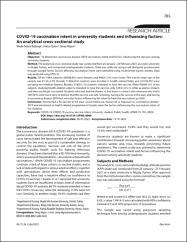COVID-19 vaccination intent in university students and influencing factors: An analytical cross-sectional study
Künye
Baybuga, M. S., H. Ozkoc, and S. Akgun. 2023. "COVID-19 Vaccination Intent in University Students and Influencing Factors: An Analytical Cross-Sectional Study." Journal of the Pakistan Medical Association 73 (4): 785-791. doi:10.47391/JPMA.6060Özet
Objective: To determine coronavirus disease-2019 vaccination intent and factors influencing the decision among university students. Method: The analytical cross-sectional study was conducted from 25 January - 25 February 2021 at a state university in Mugla, Turkey, and comprised undergraduate students. Data was collected using a self-designed questionnaire through Google Forms. Factors affecting vaccination intent were identified using multinomial logistic models. Data was analysed using SPSS 22. Results: Of the 1069 subjects, 629(58.8%) were females and 440(41.2%) were males. The overall mean age of the sample was 21.34±2.99. Overall, 712(66.6%) students were enrolled in health-related fields, and 357(33.4%) were pursuing non-medical degrees. Besides, 578(54.1%) students intended to have the vaccine. While 458(64.3%) of the subjects studying health-related subjects intended to have the vaccine, only 120(33.8%) in other academic streams said they would get vaccinated. Students who had had the disease or had been in contact with someone who had it 102(33%) were more likely to believe that the vaccine was safe. Smoking, having a flu vaccine in the past, and having a coronavirus disease-2019 test were the factors influencing the intent to have the vaccination (p<0.05). Conclusion: Having had a flu vaccine in the past, social media use, history of, or exposure to, coronavirus disease- 2019 and enrolment in health-related programme of studies were the factors influencing the vaccination intent of the students.


















